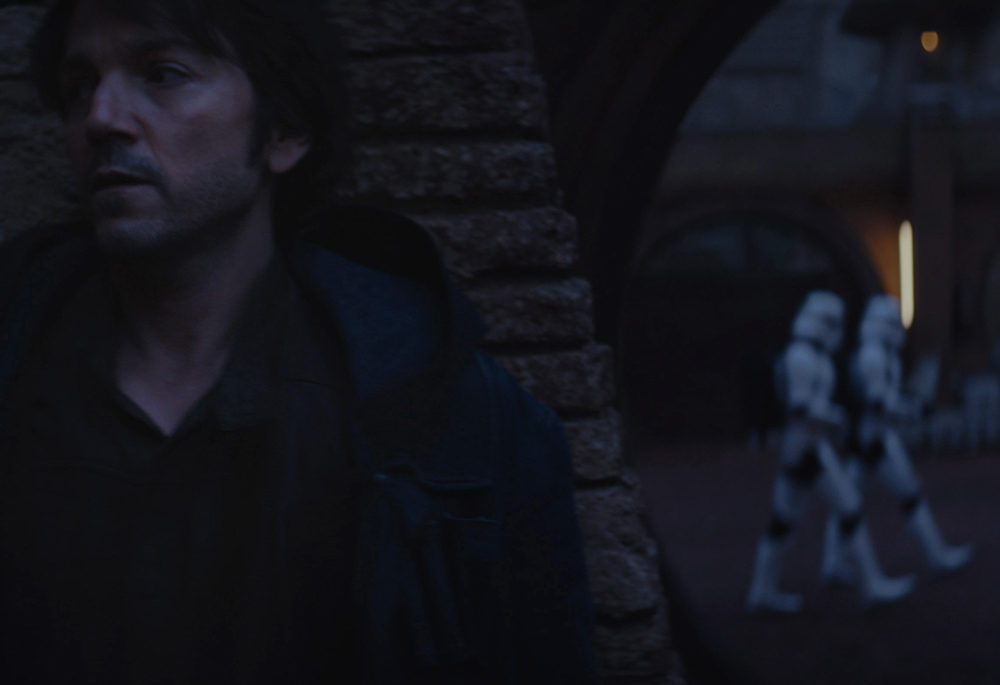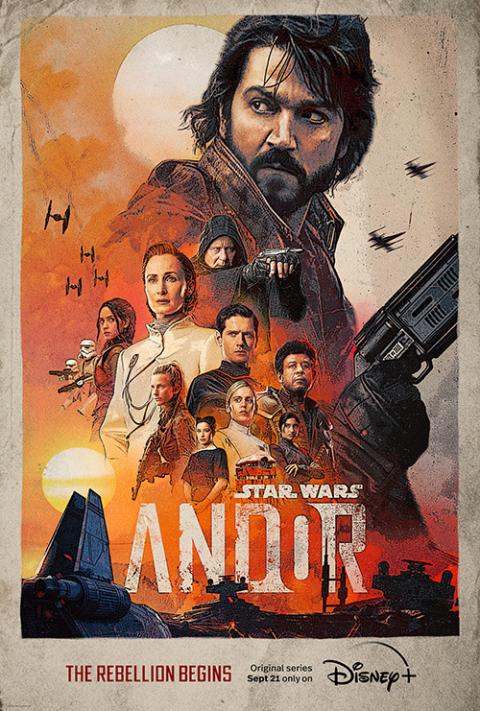
Cassian Andor (Diego Luna) in Lucasfilm's "Star Wars: Andor," exclusively on Disney+ (Courtesy of Disney+)
We often know how "Star Wars" stories will end well before they begin.
Remember in 1999 when we all rushed to see "The Phantom Menace"? We met a young Anakin Skywalker — but even before he showed up onscreen, we knew he'd fall to the dark side, becoming the eventual dark lord himself: Darth Vader.
Remember how cool it was to see Yoda fighting Chancellor-turned-Emperor-slash-secret-Sith-Lord Palpatine with that buzzing green lightsaber in 2005's "Revenge of the Sith"? It didn't matter how strong he was, that little green guy was destined for exile on Dagobah.
Even as recently as "The Mandalorian" and "The Book of Boba Fett," we see Jedi Master Luke Skywalker in all his Force-wielding glory. Wow! Amazing! Think of the action figures! And yet, pretty soon he'll be throwing back green milk all alone on that porg-infested planet, Ahch-To.
What is it about "Star Wars" that draws us back to stories that have already concluded?
The most recent installment in the franchise, "Star Wars: Andor," wrapped its first season on Disney+ last month. And though the second and final season is already in production, those of us who have seen 2016's "Rogue One" know how it will end: Cassian Andor is killed by the Death Star after successfully stealing that same superweapon's plans and beaming them up to the waiting Rebel fleet. (Further spoilers for 1977's "Star Wars": Those are the very plans Luke Skywalker relies upon to destroy the Death Star.)
"Andor" might just be some of the very best "Star Wars" out there. As a storytelling endeavor, "Star Wars" does a masterful job adding layer upon layer to supposedly settled canon. We learn more, we see more, we hear the story from a new perspective and change, ever so slightly, what we thought we knew.
In "Andor," we see a new side of the burgeoning Rebel Alliance. And it isn't always pretty.
In Genevieve O'Reilly's portrayal of the legendary senator-turned-Rebel leader Mon Mothma, we see the heartbreaking choices and daily risks taken to fund rebellion behind the scenes.
In Stellan Skarsgård's Luthen Rael, we struggle with the ethics of sacrificing people for the greater good — just as the cause may be, evil as the enemy may be.
And in the relationship between Faye Marsay's character, Vel Sartha, and Varada Sethu's Cinta Kaz, we glimpse the interpersonal struggle to build something intimate while fighting for something galactic.
And those are the good guys!
We see a new side of the Empire, too, one that doesn't shy away from torture, slaughter, brutal imprisonment and callous disregard for any and all life.
But ultimately, we see Cassian Andor, vividly portrayed once more by Diego Luna. We see him go from casual thief to mercenary to prisoner to full-throated rebel. We see him edge closer and closer to the hero we've already met in "Rogue One."
The path is a bumpy one. There's blood on his hands — lots of it — and not all of it necessary. His actions lead to others' deaths, and he seems to abandon his family in their hour of need for a pleasure planet. He dupes his friends and allies; he steals.
"Andor" does undoubtedly give us a darker take on "Star Wars." And while we know how it ends, we see more vividly the suffering, death and difficult decisions that ultimately got us to Luke's fateful run through the Death Star trenches way back in 1977.
But dark as "Andor" is — with its grisly killings, its traumatic torture, its contempt for prisoners and its wayward heroes — I believe it's a story of hope and redemption. How can it not be? Hope and redemption are at the very core of "Star Wars." We've just never seen the stakes so brutally played out.
Advertisement
We know how the story ends: We know Andor sacrifices himself for others, for the greater good.
And I wonder, for those of us of a Christian persuasion, if we might glimpse something of the Gospel story here. Because we know how that story ends, too. We know Jesus sacrifices himself; God wins the day. And yet, we know that story is still unfolding; we write our own chapter daily.
Do we struggle with suffering and death and difficult decisions? Do we always get it right? Cassian Andor is not Jesus — and neither are we. But the call Andor responds to is the same call Christ issues each of us: Keep going, keep muddling through, keep doing your best for the good of all.
That's the call of hope — and the manifestation of that hope in the daily, mundane, nitty-gritty reality of our everyday life is the work of redemption. That's where the Holy Spirit comes to us, in those dark moments when we could just as easily give up. Instead, we turn back to the light, again and again and again.
(Spoiler ahead.) Cassian Andor mutters the final words of the season: "Take me in." He's talking to Luthen Rael, a plea to join the Rebel cause.
But those words could just as easily find their way to our lips as we wrestle with hope and redemption and the working of the Spirit in our lives. We know how the story ends, but we don't yet know fully the part we will play.
All we can do is throw ourselves at the Spirit and mutter, "Take me in." And then, we muddle on.









